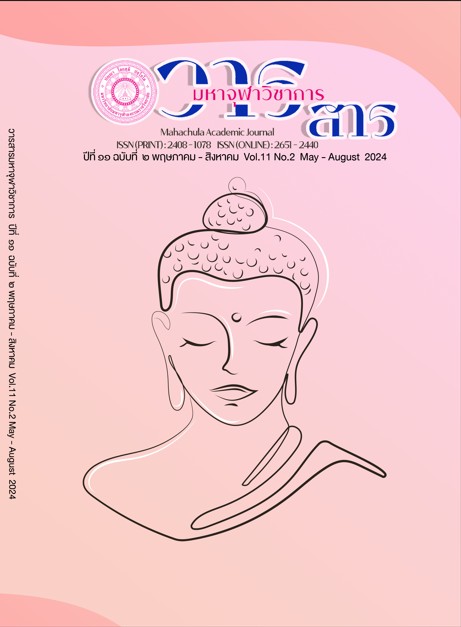A Study Of Anger Suspension Stratagem As In The Visuddhimagga Scripture
Main Article Content
Abstract
This qualitative research consists of three objectives namely:- 1) To study concept of anger in Buddhist Scriptures; 2) To study anger suspension stratagem as in the Visuddhi Magga Scripture; and 3) To study of anger suspension stratagem as in the Visuddhi Magga Scripture.
The findings revealed that, the anger that appears in the scriptures about is the anger to commit an offense, dissatisfaction, resentment, when experiencing non-pleasantness emotion such as mind and matter, sound, smell, taste, touch, etc. They will burn that person’s heart to the point of causing him to commit various unwholesome deeds, whether physical, verbal or mental. When that is the case, it affects oneself, others and society to suffer like a wildfire that burns. Therefore, there are nine causes of anger: vengeance by thinking that this person has done something that is not beneficial to us, etc. When it does, it will make the mind sinful and unwholesome. If there is more strength, it becomes a reservation, revengefulness, illwill, eventually.
Therefore, A Study of Anger according to the Visuddhi Magga Scripture consists of these things: first, the meaning of anger, second, the nature of anger, third, the cause of anger, and finally, how to suppress anger. The Suppression Stratagem of Anger consists of 10 factors, namely:- first, the way to get rid of anger by entering into compassionate contemplation, contemplating the teachings of the Buddha, optimism, teaching oneself, considering one’ s own and others’ karma, and considering the Buddha’ s conduct in the past, considering relationships in round of rebirth, consideration of benefits of the merits, consideration of separation of elements, and finally the distribution of things. They are choosing to consider how to suspension stratagem of anger in order until the anger subsides.
Accordingly, the 10 methods of anger suspension stratagem as in the Visuddhi Magga Scripture can be analyzed with the 3 methods of abandoning defilements as follows: The way to get rid of anger by entering into mercy on the Jhāna is classified as Vikkhambhana Pahāna is extinction by suppression. The rest of the methods are the consideration of the Buddha’s teachings, the optimism, the teaching of oneself, the consideration of one’s own and others’ karma, the consideration of the Buddha’s conduct in the past, the consideration of the relationship in Samsara, the consideration of the benefits of Mettā, consideration of separation of elements, distribution of things, these are considered as Tadaṅga Pahāna, by choosing to consider the method of suspension respectively. Absolutely, Samuccheda Pahāna, the practitioner must practice Samatha. Kammaṭṭhāna finally gained Jhāna and prospered Vipassanā. Kammaṭṭhāna until the attainment of Anāgāmī can be renounced Paṭigha (repulsion, irritation, and grudge).
Article Details

This work is licensed under a Creative Commons Attribution-NonCommercial-NoDerivatives 4.0 International License.
References
พระธรรมปาลเถระ,ปรมัตถมัญชุสา วิสุทธิมรรคมหาฎีกา,(บาลี-ไทย) ภาค ๓ ฉบับภูมิพโลภิกขุ (กรุงเทพมหานคร:โรงพิมพ์มูลนิธิภูมิพโลภิกขุ),
พระพรหมคุณาภรณ์ (ป.อ.ปยุตฺโต), พจนานุกรมพุทธศาตร์ ฉบับประมวลธรรม, พิมพ์ครั้งที่ ๓๖, (กรุงเทพมหานคร: โรงพิมพ์ผลิธัมม์ ในเครือบริษัท สำนักพิมพ์เพ็ทแอนด์โฮม จำกัด,๒๕๔๙),
พระพุทธโฆสเถระ,วิสุทธิมรรค,(บาลี-ไทย) ภาค ๓ ฉบับภูมิพโลภิกขุ (กรุงเทพมหานคร:โรงพิมพ์มูลนิธิภูมิพโลภิกขุ),
มหาจุฬาลงกรณราชวิทยาลัย.พระไตรปิฎกภาษาไทย ฉบับมหาจุฬาลงกรณราชวิทยาลัย.
กรุงเทพมหานคร:โรงพิมพ์มหาจุฬาลงกรณราชวิทยาลัย, ๒๕๓๙.
อรรถกถา ภาษาไทย ฉบับมหาจุฬาลงกรณราชวิทยาลัย. กรุงเทพมหานคร:โรงพิมพ์จุฬาลงกรณราชวิทยาลัย, ๒๕๕๓.


